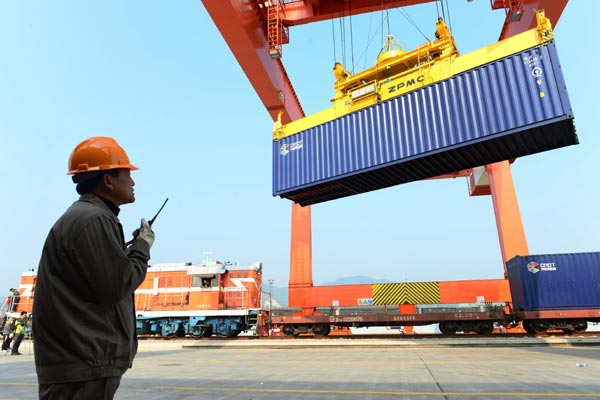|
 |
|
Containers are loaded on the first train heading for Madrid, Spain, at the railway freight transport station in Yiwu, Zhejiang province. The amount of goods carried on China's rail network declined in 2014 compared with the previous year, despite fixed-asset investment in the railways hitting a record four-year high. [Photo/China Daily] |
Ongoing spending on sector providing fillip to flagging economy
The amount of goods carried on China's rail network declined in 2014 compared with the previous year, despite fixed-asset investment in the railways hitting a record four-year high.
Cargo volume declined 3.9 percent, dragged down by shrinking industrial output, the National Development and Reform Commission revealed on Thursday.
The railway transportation sector's major sources of income, such as the coal and mineral industries, have been caught in a downturn in recent years, as has the country's manufacturing sector, to a lesser extent.
Premier Li Keqiang is reported to have once considered railway cargo volume, electricity consumption and loans disbursed by banks as his three most important indicators in forming an accurate picture of the Chinese economy.
Latest official numbers show electricity consumption rose 3.8 percent year-on-year in 2014, while new loans issued by Chinese financial institutions surged by 9.78 trillion yuan ($1.56 trillion).
The results were very much in line, said analysts, with the country's overall economic performance which saw the slowest growth of 7.4 percent in 24 years in 2014, against the official target of 7.5 percent.
Commentators said they were encouraged, however, at how the robust growth in railway investment has continued to help the slowing economy, and they expect that investment to continue this year.
Fixed-asset investment by China Railway Group, for instance, hit 808.8 billion yuan in 2014, the highest since 2011.
The group said it had raised its investment target from 630 billion yuan at the beginning of the year to 800 billion in April, to inject more impetus to the economy. Fixed-asset investment in the railway industry overall surged to 192.5 billion yuan in December alone, accounting for 24 percent of the year's total.
"Investment in railways plays an irreplaceable role in boosting the slipping economy," said Qiu Bo, an analyst with Guosen Securities.
High-speed and city-rail transit systems continue to offer the greatest potential in fuelling economic growth.
Investment of 100 million yuan in a rail transit system could stimulate 267 million yuan in gross domestic product growth, according to Qiu, who said that last year there were in fact few other options nationally for large-scale fixed-asset investment, given the limited opportunities for other major public-sector spending such as on ports, airports and highways.
Yuan Gangming, a researcher with Tsinghua University, said the government's investment priority should now be on infrastructure, which genuinely improves people's livelihood, adding that there is already an oversupply of facilities in many areas.
Since last October, the National Development and Reform Commission, the country's top economic planner, has approved more than 40 projects with a total investment of 1.3 trillion yuan with railway investment accounting for the majority.
